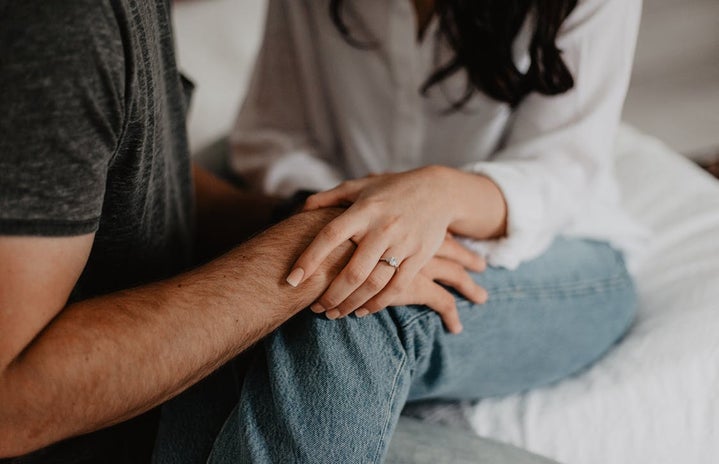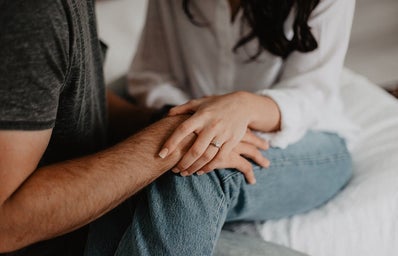Anxiety is a part of my daily life, from my morning routine to the last moments before I fall asleep. My anxiety is with me through it all, casually reminding me of all the ways I could die during the day and the various reasons my colleagues potentially hate me. Another part of my daily life happens to be my long-term partner, David.
We have been together for over four years, and last year we made the decision to move in together. That first year coexisting proved just as tricky as Instagram infographics and sitcoms promised. While being exposed to my anxiety in our first years together, being with each other in the wee hours of the morning and into the night forces one to bear all in front of their partner. This means David gets never-before-seen footage of: Me shaking and crying during panic attacks, me having to check and make sure my hair straightener is unplugged three times before we leave the house, and of course, repeatedly asking if I have done anything wrong. Like any other instance in which my anxiety takes over, I have learned to at least attempt to control these compulsions, and since David is often involved in them, he has learned ways to navigate conversations and put my mind at ease. Our relationship, like any other, has small challenges to overcome, and this is just another unique one that I can luckily share with you all.
I had a conversation with David about the most important parts of our communication and collaboration and this is what he had to say.
What is the hardest part about living with an anxious partner?
“Our standards sometimes differ. What stresses you out often doesn’t stress me out, so I often don’t think about things which inadvertently leads to you feeling anxious without me expecting it.”
“Communication and time to just learn where your boundaries fall help this, even if I’m not always perfect.”
This is something that I’ve noticed as well, and it makes sense! As an anxious person, I don’t expect people without anxiety to feel the same triggers I do. What’s important is that we can identify our differences and work towards communicating them.
What has changed the most since living together?
“I feel like I’m beginning to learn the importance of differentiating between coexistence and more strictly, quality time, and where the boundary between those is for you versus where it is for me and finding that middle ground.”
This is something we have talked about a lot over the past year. Quality time is extremely important to me, it puts my mind at ease about most relationship anxieties, and allows me to rest assured knowing that we are on the same page. I appreciate the things David does to prioritize our time together, whether it is dedicating Saturday mornings to dating or sparing an hour to watch some Modern Family.
What’s something that you do to help me calm down during a stressful day?
“Cleaning up your mess. I know how anxious you get when there’s a lot of stuff piled around, so I usually pick up little things when I walk by and put them in their place.”
A clean space is certainly something that I appreciate. When I get overwhelmed, things tend to pile up around me and I can get into a cycle of allowing things to gather and then not being able to work because of my chaotic surroundings. I remember a particular instance when I came home from a long shift at work and David had organized our bedroom and helped me go through the things I didn’t need anymore. These little acts of love make all the difference and never go unnoticed!
What are some signifiers that tell you something’s wrong? And how do you go about intervening?
“You usually get a little distant and quiet. Generally flustered. Something more specific would be the finger thing you do, like a twitch.”
“I usually bring you to our room if you aren’t already there since it’s quieter. I’ll lay down with you and figure out what’s going on, maybe make you iced tea.”
It means a lot to me that David can identify the smallest signs of a panic attack. Even in the earliest days of our relationship, if he noticed me fighting my fingers, he would hold my hand and calm me down. Besides knowing the signs, it is even more important that he knows what to do to get me moving forward. Getting me to a quiet and safe space and allowing me time to regroup is an easy way to diffuse the situation. I am often able to cool myself down, but the extra assistance to get me there is all the more helpful. I love how we can work together.
What are the best ways that I can help you understand me?
“Building slowly, as best as you can, a list of things that [bother you] day-to-day around the apartment, or the things that I do, especially ones that aren’t intuitive so that it is not unexpected when you have a reaction.”
We try our best to have frequent conversations where we lay out what has been bothering us and if there is anything we can do to ease one another’s minds. I find this to be a great technique, not only for managing anxieties but for maintaining closeness and good communication.
How do you support yourself in situations that make you feel pressure?
“The biggest thing is probably just the importance of getting things off your chest [and] generally communicating [the thoughts that aren’t fully formed], even if it’s uncomfortable.”
I’m glad that our communication helps both of us deal with stress and pressure. The best thing I could hope for is that my coping techniques help him just as much as he helps me.


